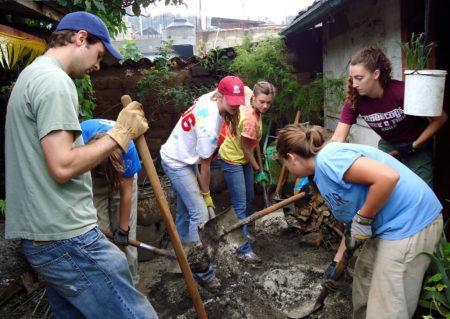“No matter the length or location, preparation is the key that will make a life-long difference in the lives of the participants. Use these strategies as a guide to help your youth focus their hearts and minds on God.”
Summer Mission Trips
For many churches, summer is a time for mission trips. Whether you have planned a youth trip, an adult trip, or an intergenerational journey, much of the spiritual transformation that takes place on a mission trip happens by design. Below are seven foundational guidelines to help you have a truly meaningful mission trip
1. Clear Mission
Mission, the purpose of the trip, is its backbone. Establish a meaningful, catchy, and memorable mission statement. Youth today desire to be part of something, not just do something. Your mission will serve as your “elevator pitch,” your first line of marketing.
2. The Power of Prayer
There are two creative ways to harness the power of prayer for participants. The first is Prayer Partners. Randomly pair everyone on the trip; they will pray daily for the health and well-being of their assigned prayer partner. During the trip they will also look out for that person each day. Post mission trip, they should continue to pray for their partner throughout the next year and check-in with them (in person, via phone, or via email) monthly.
The second way to harness prayer is to recruit Prayer Warriors, people who are not participating directly in the trip. Each participant will be backed by a Prayer Warrior, who agrees to pray for a youth daily for three to five weeks. Warriors are encouraged to send pre- and post-trip encouragement cards, along with a card or letter during the trip. At the conclusion of the trip, Prayer Warrior and participant should meet one to two weeks after the trip for reflection
3. Devotions
Devotions set the right tone and focus at the beginning, middle (lunchtime) and end of each day, as trip participants focus on God. In the morning, provide participants with a focal word for the day, such as love, hate, gratitude, kindness, grace. Write that word on their lunch bags as a reminder while they eat. If the opportunity arises, talk about the focal word at other points of the day. Finally, use the evening devotions to reflect on the day and answer the following questions:
• What did you learn today?
• What surprised you?
• Where did you see God?
4. Limit Cell Phone Use
Limiting access to technology opens our eyes to the pathway of transformation. “Unplug to Plug-in.” The world is always pulling, screaming, and pushing us. Turn phones off to hear God’s gentle voice encouraging, revealing, and stretching us. Reassure trip participants and others that adults sponsors can be reached by cell phone. Youth always have access to a cell phone to call home, which usually eases everyone’s anxiety.
5. Build Community
Creating a bonded community within the group before the mission trip is crucial. Team building, fundraising, and even t-shirts have unifying potential. Pre-trip activities build comradery, develop common memories, and allow new groups to create bonds.
Even if your church doesn’t need to raise money for a trip, fundraisers raise awareness about the trip and mission. T-shirts unite the group with a single identity and have practical applications while travelling. During the trip, shirts help leaders keep the group together and to pick trip participants out from a crowd. After the trip, shirts are reminders of the trip, the experience, and the shared spiritual journey.

6. Visit a Church
Be sure to find a church for worship either along your route or at your mission trip site. It does not need to be an Episcopal church. Wherever you worship, you will accomplish two things:
- Solidify the importance of going to church and worshiping together in community.
- Broaden their view of the Kingdom of God. Youth (and adults) can use this experience to compare and contrast their experiences at their home church.
7. Reunion
After a life-changing mission trip, bring everyone back together to remember, reflect, laugh, and even cry. Invite Prayer Warriors to join in the reunion and encourage Prayer Partners to share personal experiences. A slide show helps everyone remember the trip. An important part of the reunion is presenting the next mission trip. Past mission trip participants are the most likely participants in the future.
No matter the length or location, preparation is the key that will make a life-long difference in the lives of mission trip participants. Use these strategies as a guide to help your youth focus their hearts and minds on God.
Andrew Kuhn is Director of Family Ministries at St. David’s Church in Wayne, Pennsylvania.
This article was originally published in the Spring 2015 issue of Episcopal Teacher. Subscribe for free here.

